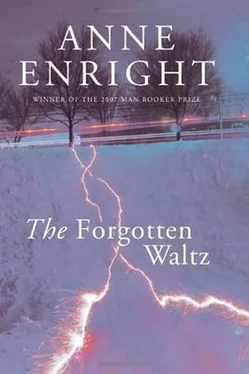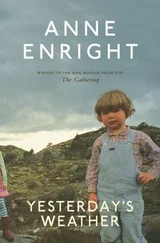‘She’s upstairs having a cuddle.’
‘Right.’
There seemed very little I could say to this, but he had already turned and run back into the front room. The door was still open, so I pushed through into the hall and closed it quietly behind me.
‘And where’s your sister?’ I said, carefully. ‘Out.’
‘And what are you doing?’
‘I’m writing a book,’ he said.
He was on his knees in the living room. I thought he might tell me more about it, but he just flopped back down on to the floor and pulled the pages of his copy book into the crook of his arm. He stuck his tongue out of the corner of his mouth and wrote: bum in the air, cheek on the page, eyes inches away from the pen’s moving tip.
I sat and watched him for what seemed like a long time. The house was entirely silent. I was about to ask him more questions, when I heard someone come downstairs and go into the back of the house. It was Fiona, I saw her through the connecting doors. She was wearing her dressing gown and she looked, I thought, distinctly rested, you might almost say ‘refreshed’. She put the kettle on, then saw me and took fright.
‘How long have you been here?’
‘I just arrived,’ I said.
‘Jack, you should always tell me if there’s someone at the door. Always, all right?’
‘Don’t worry,’ I said trying to protect him from her.
‘Do you hear me, Jack?’
‘All right.’
She looked at me and gave a crooked smile.
‘You want some tea?’
‘We need to talk about the house,’ I said later when the relief hit.
‘Yeah. The house,’ she said, and waved a depressed hand in the air. And to be fair to Fiona, she has never been greedy in that way.
‘Did I tell you, we sold the place in Brittas?’
‘No.’
‘Well we did. I’m telling you, nothing is shifting over a million. Nothing. Shay says.’
‘Really?’ I said.
‘Nothing being built. Not one brick, he says, on another brick, this year. Not one.’
‘Well it was too mad,’ I said. ‘Wasn’t it?’
‘You think?’
And we listen to it for a moment; the rumour of money withering out of the walls and floors and out of the granite kitchen countertops, turning them back to bricks and rubble and stone.
Shay came downstairs, freshly showered and full of himself, in his polo shirt and jeans.
‘Gina!’ he said, like we were old golfing buddies too long away from the tees. Then he left, at speed, in order to pick up Megan. Fiona started putting a salad together on the kitchen island and I said it was over between myself and Seán. Just in case she wanted to know. Just in case she was interested.
‘Finished,’ I said. I did not want to see him again. He could go back to his wife.
‘What do you mean “go back”?’ said Fiona. ‘He never left.’
‘Whatever.’
‘I don’t think he even told her, you know?’
‘No?’
So I really did mean it, when I said I did not want to see him again – not ever. Seán was three hundred yards down the road, playing the family man, my sister was in her kitchen, playing the perfect wife and I was the perfect fool. There would be penalties, I knew that. Because I really felt, just then, that I had lost the game.
‘I don’t know what you saw in him,’ said Fiona.
‘Little fucker,’ I said.
‘It’s just something he does, you know. You’re not supposed to take it seriously.’
‘Well I did.’
‘He sat there,’ she said, and she was angry now – whether she was angry with me, or on my behalf, it was hard to tell.
‘He sat there,’ pointing at a leather tub chair. ‘And he told me how lonely he was. No. He told me how lonely his wife was. How worried he was about his wife.’
‘When was that?’ I said.
Fiona looked at the sheet of glass between the kitchen and the garden, where her reflection was emerging from the dusk. She checked her face, its degree of sadness, and the state of her hair.
‘Little fucker,’ she said. ‘I was fond of him.’
And she leaned over the black granite of her kitchen island, making claws of her upturned hands, the way Seán does, when he is in persuasive mode.
But you know, everyone makes a pass at Fiona, it is the burden she carries through life. Even the postman fancies my sister, she is a martyr to it, she can’t even open her own front door.
‘When was that?’ I said again.
‘Oh I don’t know,’ she said.
And then I remembered something else about my sister. It’s not that everyone fancies her, that is not her problem. Her problem is the way they love her. Men. They don’t want to shag her so much as pine for her. That is the thing that makes her sad.
‘Years ago,’ she said. ‘I was about two minutes’ pregnant with Jack. I remember, I was really stupid with it. I couldn’t figure out what he was saying to me.’
‘What did he say?’
‘Oh I don’t know.’ She moves to the double-door fridge that seems to occupy half her kitchen wall. ‘What do they ever say?’
She opens it and the plastic seal gives way with a slight sucking sound. She says, ‘Gina. You know there’s no work for Shay. You know he hasn’t worked since October last.’
Knocking on Heaven’s Door
WHEN EVIE WAS four years old, she fell off the swing and Aileen slapped the au pair, and Seán, when he arrived home, put his little finger into his daughter’s mouth to find where she had bitten the inside of her cheek. He checked her pupils.
‘Look at me, Evie. Now look up at the light.’
‘I lost my shoe,’ she said.
So he went out into the dusk and found the little glittering ballet flat beside the swing. The back of it was smeared with clay, and there was a little divot of turf still attached to the heel.
There was a time, after Fiona’s ruthless little anecdote in her kitchen, that I questioned everything that had happened between myself and Seán, down to our choice of bed. I had missed key details, I thought: I had misread the signs. If love is a story we tell ourselves then I had the story wrong. Or maybe passion is just, and always, a wrong-headed thing.
Now, I feel if I can figure out what happened to Evie, I can tell the story properly. If I can think about it and understand it, then I will be able to understand Seán, and ease his pain.
The evening she fell off the swing, they sat with the drained and smiling child in the GP’s waiting room, and she turned to her father and said, ‘Did I die?’
‘Don’t be silly,’ he said. ‘Look at you, you’re all alive!’
The doctor, who had a marked English accent, introduced himself as ‘Malachy O’Boyle’ – a name so makey-uppey and Irish that, Aileen said later, ‘it was definitely fake’. He sat Evie up on his examining couch and laid her down. He felt the back of her head, checked her pupils and all her signs, while listening to, and ignoring, Aileen’s clear and agitated description of events that afternoon.
‘Did she have a temperature?’
‘No.’
‘Are you sure?’ At which Aileen fell silent, because of course, she had not been there.
‘So Evie,’ he said – now he had dealt with her mother. ‘Tell me what happened.’
‘I fell off the swing,’ she said.
‘Anything else?’
‘Nope.’
‘Good girl,’ he said. ‘Did anything happen before you fell? What were you looking at?’
She gave him a keen and suspicious glance and said, ‘The clouds.’
‘Were they nice clouds?’
Evie did not answer. But she did not take her eyes off him, either then or subsequently, and when, at the end of the consultation, he offered her a lollipop she said, ‘No thank you,’ which, from her, was a very great insult indeed.
Читать дальше












